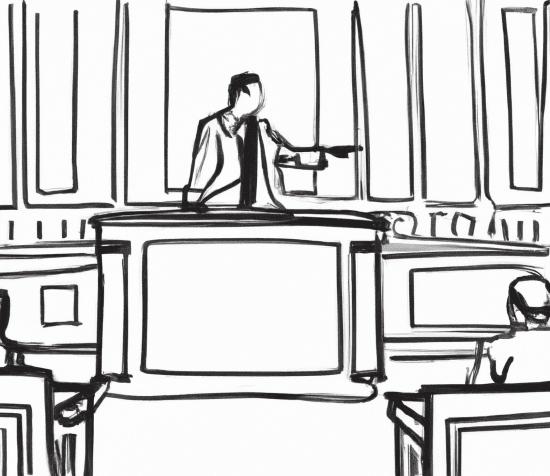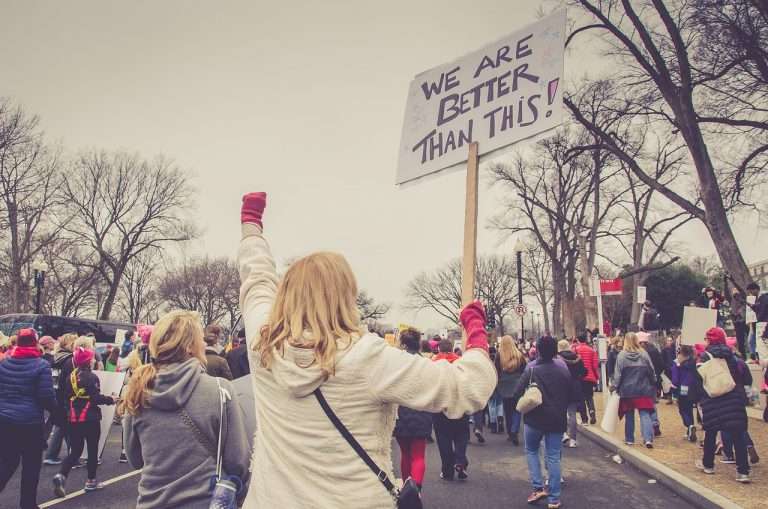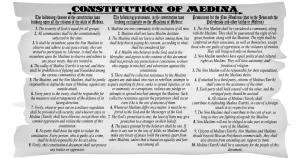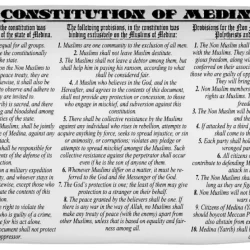Ah, the rule of law – that elusive concept that seems to slip through our fingers like sand. Some say it’s a unicorn, a mythological creature that exists only in the imaginations of idealistic legal theorists. Others say it’s like the tooth fairy, a benevolent force that magically appears to make sure justice is served. But what is the rule of law? And what are its key principles? Is it all just a fairy tale, or is there some truth to this mystical concept? In this article, we will explore the ins and outs of the rule of law, from its historical roots to its modern-day applications. So buckle up and get ready to take a deep dive into the world of legal theory – it’s going to be a wild ride!
What is Rule of law?
The rule of law is a critical concept that serves as a foundation for law and governance in a just and democratic society. It implies that no individual or entity is above the law, including those in positions of power. This principle ensures that everyone is accountable for their actions and that justice is served impartially, without any discrimination or favoritism. The rule of law also provides a framework for promoting economic development and safeguarding individual freedoms by ensuring that contracts and property rights are respected and enforced. Without the rule of law, there would be chaos and uncertainty, and citizens would be at the mercy of those in power.
The concept of the rule of law has been widely debated and discussed by legal scholars, philosophers, and political scientists. While there is no universally accepted definition, the basic principles of the rule of law are widely agreed upon. One of the essential principles of the rule of law is that laws must be clear, predictable, and applied equally to all individuals, regardless of their status or position. This ensures that the legal system is fair, just, and effective in protecting the rights of individuals and promoting the common good. Additionally, the rule of law requires an independent judiciary and a legal system that is free from political interference and corruption. These principles are crucial for maintaining a legal system that is impartial, transparent, and accountable, and they help to ensure that no one is above the law.
What is the Rule of Law and Why is it Important in a Democratic Society?
History of the Rule of Law
The concept of the rule of law has roots that date back to ancient civilizations such as Egypt, Babylon, and Greece. However, it was the Roman Empire that made the most significant contribution to the development of the rule of law. The Roman legal system was based on the principle of “ius civile,” which meant that the law applied equally to all Roman citizens. This principle was the foundation of the Roman legal system and remained influential throughout the Middle Ages and the Renaissance.
In 1215, the Magna Carta was created, which established the principle that the king was not above the law, and that all individuals had certain legal rights. During the 17th and 18th centuries, the rule of law became a central concept in the development of modern Western legal systems. The concept was further developed in the United States Constitution, which established a system of checks and balances to prevent abuses of power and protect individual liberties.
The modern conception of the rule of law emerged during the Age of Enlightenment in Europe, where philosophers such as John Locke and Jean-Jacques Rousseau emphasized the importance of a legal system based on rationality and fairness. The British jurist, Sir Edward Coke, famously declared that “the king is under no man, but under God and the law,” affirming the principle that even the monarch was subject to the law, and no one was above it. This concept was further developed during the Enlightenment period, with the ideas of Montesquieu, who advocated for the separation of powers and an independent judiciary.
Today, the rule of law is an essential component of modern legal systems around the world. It is enshrined in the constitutions of many countries and forms the basis of international law. Despite its widespread acceptance, the rule of law remains an aspirational goal in many parts of the world, where corruption, political interference, and weak institutions can undermine its implementation. The continued promotion and protection of the rule of law remain a critical challenge for governments, legal scholars, and civil society actors.
Principles of the Rule of Law
The rule of law is a foundational principle in modern legal systems, essential for ensuring fairness, justice, and accountability. It is a concept that applies to all individuals and entities, including governments and public officials, who must be held accountable for their actions and decisions. To ensure the effective implementation of the rule of law, several key principles have been developed and widely accepted. These principles provide a framework for ensuring that laws are clear, predictable, and applied equally to all individuals, regardless of their status or position. They also promote the independence of the judiciary and the legal system, free from political interference and corruption. Understanding these key principles is critical for ensuring that legal systems are fair, just, and effective in protecting the rights of individuals and promoting the common good.
Supremacy of Law
The principle of the supremacy of law means that no one is above the law and that all individuals and institutions are subject to the same laws. This principle is fundamental to the rule of law and is essential for ensuring that justice is accessible to all.
As A.V. Dicey, a renowned legal scholar, wrote, “No man is punishable or can be lawfully made to suffer in body or goods except for a distinct breach of law established in the ordinary legal manner before the ordinary courts of the land.” This principle means that the law is above all individuals and institutions, including the government. Even the government is subject to the law and must follow it just like any other citizen.

Countries that have successfully implemented this principle include the United States and the United Kingdom, where the rule of law is deeply ingrained in their legal systems. However, there are many countries where the principle of the supremacy of law is not respected, and the government can act outside the bounds of the law with impunity. Such countries include North Korea and Syria, where the government has complete control over the legal system and can violate the rights of citizens with impunity.
Equality before the Law
The principle of equality before the law means that all individuals are equal before the law and that no one is entitled to special treatment or privileges. This means that everyone is entitled to the same legal rights and protections. This principle is essential for ensuring that justice is administered fairly and consistently.
As Thomas Paine, an American philosopher, and founding father, wrote, “In America, the law is king.” This quote reflects the idea that in a society that respects the rule of law, all individuals are subject to the same laws and are entitled to the same legal protections.
Lord Atkin famously stated, “The law is not a brooding omnipresence in the sky, but the articulate voice of a sovereign people.” The principle of equality before the law is essential to ensuring that the legal system is fair and just and that everyone is held accountable for their actions.
Countries that have successfully implemented this principle include Sweden and Norway, where equality before the law is enshrined in their constitutions and legal systems. However, many countries, such as Saudi Arabia and Iran, have legal systems that discriminate against certain groups based on factors such as gender, religion, or ethnicity.
Independence of Judiciary
The principle of an independent judiciary means that judges are free from political influence and that they make decisions based on the law and not on political considerations. This means that judges must be impartial and make decisions based on the law and the facts of the case.
Former Chief Justice Earl Warren stated, “The judiciary is the safeguard of our liberty and our property under the Constitution.” The principle of an independent judiciary is essential to ensuring that the legal system is fair and just and that judges are not swayed by political considerations.
This is only possible by the division of governmental power into three branches: the legislative, the executive, and the judiciary. The separation of powers ensures that no one branch of government can become too powerful and that each branch serves as a check on the others and ultimately make the Judiciary independent from political or any undue influence.
As Montesquieu, a French philosopher and political theorist, wrote, “There can be no liberty where the legislative and executive powers are united in the same person or body of magistrates.” This quote reflects the idea that a separation of powers is essential to prevent the concentration of power and the abuse of power.
What is Separation of Powers and Why is it Important for Good Governance?
As John Locke famously said, “Wherever law ends, tyranny begins.” Locke believed that the separation of powers was necessary to prevent any one person or group from gaining too much power and potentially becoming tyrannical.
Countries that have successfully implemented this principle include the United States and Germany, where the judiciary is independent and can make decisions without fear of political retribution. However, many countries, such as China and Russia, have legal systems that are heavily influenced by the government, and judges are not free to make independent decisions.
Due Process of Law
The principle of due process of law means that individuals have the right to a fair and impartial trial and that they must be given notice of any charges brought against them and an opportunity to defend themselves. This principle is essential to ensuring that justice is served and that individuals are not punished unfairly.
The principle of due process of the law states that individuals must be given notice and an opportunity to be heard before the government can deprive them of their life, liberty, or property. This means that individuals are entitled to a fair trial and other legal protections.
One philosopher who emphasized the importance of due process is Thomas Paine, who wrote that “the right of trial by jury is a safeguard against an oppressive government.” He believed that the ability of individuals to defend themselves in court was essential to protecting their rights.
As Justice Robert H. Jackson stated, “The very purpose of a Bill of Rights was to withdraw certain subjects from the vicissitudes of political controversy, to place them beyond the reach of majorities and officials, and to establish them as legal principles to be applied by the courts.” The principle of due process of law is fundamental to ensuring that individuals are protected from arbitrary government action.
One example of a country that has struggled with upholding this principle is Saudi Arabia, where individuals have been subjected to arbitrary detention, torture, and unfair trials, leading to concerns about human rights violations and the rule of law.
Transparency and Accountability
The principle of transparency and accountability is a critical component of the rule of law. Transparency refers to the openness of government actions and decisions, which should be accessible to the public with clear rules and procedures. Accountability means that government officials are responsible for their actions, and they should be answerable for any violations of the law.
The philosopher Jeremy Bentham believed that publicity is the soul of justice. He argued that when government officials know that their actions are being watched and scrutinized, they will be more likely to act in the best interests of the public. Similarly, Louis Brandeis, a former US Supreme Court Justice, stated that sunlight is the best disinfectant, implying that transparency is necessary to root out corruption and ensure fair and just government actions.
Transparency also means that laws and regulations are publicly available, and legal decisions are made in a public forum. In practice, transparency ensures that the legal system is not arbitrary or biased and that decisions are made based on established rules and procedures. This principle helps prevent abuses of power, corruption, and other forms of illegal and unethical behavior by public officials.
A lack of transparency in government can have serious consequences. In some authoritarian regimes, legal proceedings may be held in secret, with little or no public scrutiny, and decisions may be made based on personal interests rather than the public good. This lack of transparency can lead to corruption, abuse of power, and a breakdown in the rule of law.
An example of the importance of transparency and accountability in action is the Watergate scandal in the United States. During the 1972 presidential election, members of the Republican Party broke into the Democratic Party headquarters in the Watergate building to steal information. The cover-up of the crime involved high-ranking government officials, including President Nixon. However, through the investigative journalism of reporters and the transparency of the legal process, the truth was eventually revealed, and the officials responsible were held accountable for their actions.
Significance of the Rule of Law in Contemporary Legal Systems
The rule of law is an essential principle that underpins the functioning of contemporary legal systems. It is a cornerstone of democratic societies and is necessary for the protection of individual rights and freedoms. The significance of the rule of law can be seen in the following ways:
Protection of Individual Rights and Freedoms
The rule of law is essential for protecting individual rights and freedoms. It ensures that everyone is subject to the same laws and that no one is above the law. This principle provides a framework for the protection of individual rights and freedoms, such as the right to a fair trial, freedom of speech, and the right to privacy. The rule of law ensures that these rights are respected and upheld, regardless of a person’s status or position in society.
Promotion of Social Stability
The rule of law promotes social stability by providing a framework for the resolution of disputes and conflicts. It provides a mechanism for the peaceful resolution of conflicts, reducing the likelihood of violence and social unrest. The rule of law also ensures that there is accountability for actions that are harmful to society, which deters individuals from engaging in behavior that is harmful to others.
Facilitation of Economic Development
The rule of law is essential for facilitating economic development. It provides a framework for the protection of property rights and the enforcement of contracts, which are necessary for economic growth and development. The rule of law ensures that businesses are subject to the same laws and regulations, which promotes fair competition and provides a stable environment for investment and entrepreneurship.
How the US and UK tried to justify the invasion of Iraq
Upholding of Democratic Principles
The rule of law is necessary for the protection and upholding of democratic principles. It ensures that government actions are subject to legal scrutiny and that the rights and freedoms of individuals are protected from government encroachment. The rule of law ensures that democratic principles such as the separation of powers, the right to vote, and the protection of minority rights are respected and upheld.
Rule of Law in Practice
The concept of the rule of law is essential for the functioning of legal systems both at the national and international levels. However, the application of the rule of law in practice can vary significantly across different countries and regions. In this section, we will explore the global and national perspectives on the rule of law and examine examples of countries with strong and weak rules of law. We will also consider the importance of the rule of law in international relations and national governance and highlight the significance of promoting and upholding these principles.
Global Perspective
The rule of law is not only essential for the functioning of domestic legal systems but also for the maintenance of international relations. The rule of law provides a framework for resolving disputes between countries, ensuring that international agreements are upheld, and promoting cooperation between nations. The World Justice Project’s Rule of Law Index has identified the importance of the rule of law in promoting sustainable development and economic growth, reducing poverty and inequality, and ensuring peace and security.
The World Justice Project’s Rule of Law Index provides a comparative assessment of the rule of law in 126 countries around the world. According to the 2020 report, the top five countries with the strongest rule of law are Denmark, Norway, Finland, Sweden, and the Netherlands, while the bottom five countries are Afghanistan, Cambodia, Venezuela, Cambodia, and Zimbabwe. The report also identifies significant regional differences, with North America and Western Europe having the strongest rule of law scores, while Sub-Saharan Africa and the Middle East, and North Africa have the weakest scores.
National Perspective
The rule of law is essential for national governance, as it provides a framework for ensuring that government officials are accountable to the people they serve. The rule of law promotes the protection of individual rights and liberties, provides a system for resolving disputes, and ensures that laws are applied consistently and fairly.
In addition, countries with a strong rule of law tend to have higher levels of economic development and lower levels of corruption, while countries with a weak rule of law tend to have higher levels of poverty and inequality, as well as higher levels of corruption and social instability. For example, Denmark and Sweden, which are consistently ranked as having a strong rule of law, also have high levels of economic development and low levels of corruption, while countries like Zimbabwe and Venezuela, which are consistently ranked as having a weak rule of law, have high levels of poverty and inequality, as well as high levels of corruption and social instability.
Challenges to the Rule of Law
While the rule of law is an important ideal for legal systems around the world, it is not always easy to achieve in practice. Many factors can pose challenges to the rule of law, including political interference, corruption, and lack of public trust. These challenges can undermine the principles of the rule of law and erode public confidence in the legal system. In this section, we will explore some of the key challenges to the rule of law and their implications for legal systems around the world.
Political Interference
Political interference refers to the influence of political actors, such as government officials or political parties, on the functioning of the legal system. This interference can take many forms, including the appointment of judges based on political loyalty, the manipulation of legal decisions for political gain, or the use of political pressure to influence legal proceedings. Examples of political interference in the legal system can be found in countries such as Russia, Turkey, and Hungary, where governments have been accused of using their power to undermine the independence of the judiciary.
Political interference can have severe implications for the rule of law. It undermines the fundamental principles of impartiality and independence that are necessary for the legal system to function effectively. Political interference can lead to a lack of trust in the legal system, which can ultimately result in social and political instability. It also poses a threat to individual rights and freedoms by limiting access to fair and impartial justice.
Corruption
Corruption refers to the abuse of power or authority for personal gain. Corruption can take many forms, including bribery, embezzlement, and nepotism. In the legal system, corruption can manifest in the form of judges accepting bribes, lawyers using their influence to gain favorable outcomes for their clients, or officials using their power to manipulate legal decisions. Examples of corruption in the legal system can be found in countries such as Brazil, India, and Ukraine, where corruption has been identified as a significant challenge to the rule of law.
Corruption poses a severe threat to the rule of law. It undermines the principles of fairness and impartiality that are essential for the functioning of the legal system. Corruption can lead to a lack of trust in the legal system and ultimately result in social and political instability. It also poses a threat to individual rights and freedoms by limiting access to fair and impartial justice.
Lack of Public Trust
The lack of public trust refers to a situation where the public has lost faith in the legal system’s ability to provide fair and impartial justice. This lack of trust can be the result of a variety of factors, including corruption, political interference, and systemic inequalities. Examples of the lack of public trust in the legal system can be found in countries such as the United States, where the justice system has been criticized for its treatment of marginalized communities, or in countries such as China, where the legal system is seen as being heavily influenced by the ruling Communist Party.
The lack of public trust poses a severe challenge to the rule of law. It undermines the legitimacy of the legal system and can ultimately result in social and political instability. When the public does not trust the legal system, they may resort to extralegal means to seek justice, which can result in a breakdown of social order. Additionally, the lack of public trust can lead to a lack of participation in the legal system, which can limit access to justice for marginalized communities.
Conclusion
The rule of law is a fundamental concept in the field of law and governance. It is based on several key principles, including the principle of legality, equality before the law, an independent judiciary, due process of law, and transparency. These principles are essential to ensuring a fair and just legal system, protecting individual rights and liberties, and promoting economic development. Law students must understand the significance of the rule of law in contemporary legal systems and work to uphold these principles in their future careers.















